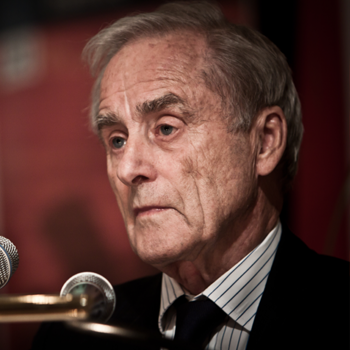One of Britain’s most respected journalists and the crusading editor of The Sunday Times for 14 years, Harold Evans brought a new style of investigative reporting to his country and focused the attention of his readers on the plight of Thalidomide victims. The drug brought birth defects to thousands of newly born babies around the world. In 1982, the year after Times Newspapers was taken over by Rupert Murdoch, Evans was appointed editor of The Times. He resigned after only a year to protest what he considered the media tycoon’s manipulation of the newspaper, becoming one of Murdoch’s most dogged critics.
Harold Matthew Evans was born on June 28, 1928, in Manchester, England. He began his career at 16 as a reporter for a weekly newspaper. After service in the Royal Air Force and studies at Durham University and the University of Chicago, he first made his reputation as editor of The Northern Echo, a leading provincial daily, where his campaigns resulted in a national program for detecting cervical cancer and a pardon for a man wrongly executed for murder.
From 1967 to 1981, Evans redefined the standards of British investigative journalism by founding The Sunday Times’ famous Insight unit of investigative reporters and backing them through a long series of scoops. Under his editorship, the paper uncovered the Kim Philby spy scandal and published, at the risk of criminal prosecution under the Official Secrets Act, the diaries of former Labour Minister Richard Crossman, which revealed “how the British system of government really works, for good and for ill.”
His most famous campaign, however, was on behalf of the hundreds of Thalidomide children in Britain, most of whom had not received any compensation for the severe birth defects inflicted on them because their mothers had taken the drug during pregnancy. Risking his career and professional reputation, Evans took on the drug companies and fought them for years through the English courts. He won a famous victory at the European Court of Human Rights against the suppression of the Thalidomide articles by the House of Lords, and the victims’ families won redress after more than a decade.
“It was one of the most memorable days of my life when … I sat in Strasbourg on April 26, 1979, and listened to the conclusion of ‘L’affaire Sunday Times’,” Evans wrote. “Twenty judges of the European Court had deliberated. … Nine of them were against us, including the British judge, but eleven carried the court: ‘We find there has been a violation of Article 10 [of the European Convention of Human Rights].’ This meant the House of Lords injunction had infringed our rights to free speech and that the law of contempt would have to be liberalised in Britain in the spirit of the Convention.”
In 1981, Rupert Murdoch acquired Times Newspapers. Evans was appointed editor but resigned one year later because of policy differences. Parliament had asked Murdoch for guarantees that editorial independence would continue to be honoured under his proprietorship. “In my year as editor of The Times, Murdoch broke all these guarantees.”
On leaving The Times, Evans became a director of Goldcrest Films and Television until 1984, when he moved to the United States to teach a course on the press and the U.S. Constitution at Duke University, North Carolina. That same year, he was appointed editor-in-chief of the Atlantic Monthly Press and subsequently editorial director of U.S. News and World Report.
He was appointed president and publisher of Random House from 1990 to 1997 and editorial director and vice chairman of U.S. News and World Report, the New York Daily News, and The Atlantic Monthly from 1997 to 2000, when he resigned to begin full-time work on two major writing projects following up on the success of his acclaimed bestseller, The American Century.
Evans was awarded a knighthood by the British Crown for services to journalism in 2004. Speaking after becoming a Knight Bachelor at Buckingham Palace, he said: “I want to divide it up into 140 bits – most of my success comes from colleagues, so I call them all knightlets.”
In 2009, Evans released his critically-acclaimed autobiography, My Paper Chase: True Stories of Vanished Times. He was named editor-at-large at Thomson Reuters in 2011.
A long-time member of IPI and a former member of its executive board, Evans has always maintained an active interest in IPI’s activities. In the early 1960s, for example, he offered his services and time to conduct workshops for news editors and reporters in New Delhi and other Asian centres. One important end-product of these seminars was the production of the first IPI training manual for news editors in the developing world, The Active Newsroom. Written by Evans, this enormously successful publication explained with lively, practical examples how to make newspapers more readable through better news editing, reporting and layout.



